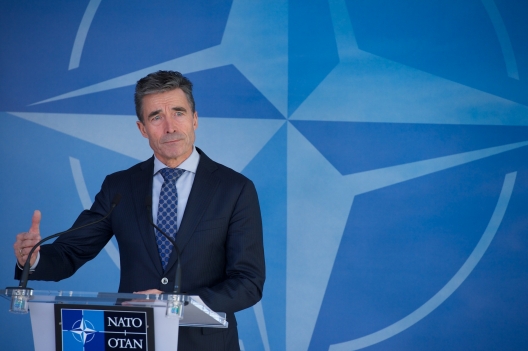 [W]hat we have seen in… in Ukraine is outrageous. We have seen illegal Russian military actions in Crimea. We have seen an illegal annexation of Crimea. There’s no doubt that Russia is deeply involved in the destabilization of the situation in eastern Ukraine. We have seen the Russian doctrine that they preserve the right to intervene in other countries to do what they call protect the interests of Russian-speaking communities. For many very obvious reasons, our eastern Allies are gravely concerned by that Russian behaviour.
[W]hat we have seen in… in Ukraine is outrageous. We have seen illegal Russian military actions in Crimea. We have seen an illegal annexation of Crimea. There’s no doubt that Russia is deeply involved in the destabilization of the situation in eastern Ukraine. We have seen the Russian doctrine that they preserve the right to intervene in other countries to do what they call protect the interests of Russian-speaking communities. For many very obvious reasons, our eastern Allies are gravely concerned by that Russian behaviour.
So their concerns are definitely not exaggerated, and they should be taken seriously. And I think their concerns are being taken seriously. And… and this is the reason why we have taken immediate steps to reinforce collective defence, and that’s the reason why we are now considering further steps, more long-term measures, to reinforce collective defence.
And I think all Allies are listening carefully to the concerns expressed by our eastern Allies. And we should. . . .
[I]t’s also clear that the illegal Russian military actions in Ukraine have created a completely new security situation in Europe. For more than 20 years, we have based our defence planning on the assumption that there would be no imminent threat from Russia.
But now we have seen the Russian doctrine that Russia preserves the right to intervene in other countries to protect the interests of Russian communities, and we have seen their actions in Crimea and in eastern Ukraine, and learned that this doctrine is not just words; it can easily be transformed into action.
We have seen the Russian military doctrine that NATO is considered an adverse… an adversary. And I think we should take that seriously. It’s not just words. So we have to adapt accordingly to review our defence plans, enhance our exercises, and also consider appropriate deployment. . . .
Excerpts from press conference by NATO Secretary General Anders Fogh Rasmussen, May 19, 2014.
Image: NATO Secretary General Anders Fogh Rasmussen, April 16, 2014 (photo: NATO)
